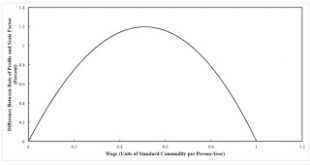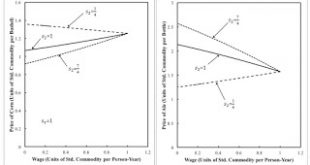Figure 1: Rate of Profits Unequal to Scale Factor for Rate of Profits This post continues the example in the previous post. I modify the prices equations so that the rate of profits in producing corn is (s1 r̂), and the rate of profits in producing ale is (s2 r̂). The solution to the price equations are: pcorn = 16 [16 + (s1 - s2) r̂]/[204 + (3 s1 + 9 s2) r̂] pale = 32 [10 - (s1 - 3 s2) r̂]/[204 + (3 s1 + 9 s2) r̂] w = 4 [51 - (9 s1 + 5 s2) r̂ - s1s2 r̂2]/[204 + (3 s1 + 9 s2) r̂]...
Read More »An Example Of The Labor Theory Of Value
Figure 1: Variation of Prices of Production with Wages and Markups1.0 Introduction This post documents an example in my working paper, The Labor Theory of Value and Sraffa's Standard Commodity with Markup Pricing. 2.0 Technology Consider a simple economy in which corn and ale are each produced from inputs of labor, corn, and ale. Inputs for unit outputs are shown in the columns in Table 1. Obviously, the units of measure should not be taken serious. Inputs are totally used up in the...
Read More »Michael Roberts — US rate of profit measures for 2018
Every year, I look at measuring the US rate of profit a la Marx. Official data are now available in order to update the measurement for 2018 (not 2019 yet!). As usual, if you wish to replicate my results, I again refer you to the excellent manual for doing so, kindly compiled by Anders Axelsson from Sweden.There are many ways to measure the rate of profit a la Marx (for the various ways, see http://pinguet.free.fr/basu2012.pdf). As previously, I start with an update of the measure used by...
Read More »The Labor Theory of Value and Sraffa’s Standard Commodity with Markup Pricing
I have uploaded a working paper with the post title. Abstract: This article demonstrates relationships that are transparent in Sraffa's standard system hold even when relative rates of profit vary persistently among industries. Even with such variations, total constant capital, total variable capital, total surplus value, and the rate of profits are unaltered by evaluation at labor values and at prices of production in Sraffa’s standard system. These results buttress those who see in the...
Read More »Variation in Standard Commodity with Relative Markups
I am not sure about the economic logic in this post. Maybe somebody like D'Agata or Zambelli could do something with this. These ideas were suggested to me by email with a sometime commentator. I start out with notation for Sraffa's price system, modified in an unusual way to allow for persistent variations in the rate of profits among industries: a0 is a row vector of labor coefficients in each of n industries. A is a Leontief input-output matrix, where ai, j is the quantity of the ith...
Read More »Some comments about Marx’s epistemology — Prabhat Patnaik
Marx’s eleventh thesis on Feurbach: “the philosophers have hitherto only interpreted the world in various ways, the point is to change it”, has been often taken to mean that interpreting the world and changing the world are two separate and disconnected activities…. In my view, in drawing this distinction, Marx was not referring to two separate activities, but to two separate ways of interpreting the world: one is interpreting the world from the perspective of changing it, which means...
Read More »Bill Mitchell — Spending equals income whether it comes from government or non-government
It is now clear that to most observers that the use of monetary policy to stimulate major changes in economic activity in either direction is fraught. Central bankers in many nations have been pulling all sorts of policy ‘rabbits’ out of the hat over the last decade or more and their targets have not moved as much or in many cases in the direction they had hoped. Not only has this shown up the lack of credibility of mainstream macroeconomics but it is now leading to a major shift in policy...
Read More »Review of Money and Totality by Fred Moseley — The Internationalists
This is a substantial book which the author admits has been 20 years in the making. [1] It deals primarily with Moseley’s own “Macro-Monetary” interpretation of Marx’s economic writings and takes up and rebuts criticisms of this interpretation. However, the book also looks critically at the major interpretations of Marx’s economic work, by Marxist academic economists, which have emerged in the last 100 years, giving a brief description of them and critically examining their failings. Many...
Read More »Hegel [and Marx] on labor and freedom — Daniel Little
So does labor fulfill freedom or create alienation? Likewise, does technology emancipate and fulfill us, or does it enthrall and disempower us? Marx's answer to the first question is that it does both, depending on the social relations within which it is defined, managed, and controlled. It would seem that we can answer the second question for ourselves, in much the same terms. Technology both extends freedom and constricts it.... Adding to what David Little says in this post, Hegel and...
Read More »Labor Power as the ‘Money Commodity’ — Peter Cooper
For Marx and many Marxists, money is based in a commodity; in Modern Monetary Theory (MMT), it is not, being based instead in a social relationship that holds more generally than just to commodity production and exchange. Even so, to the extent that commodity production and exchange are given sway within ‘modern money’ economies, operation of the Marxian ‘law of value’ appears to be compatible with MMT. It is just that, from an MMT perspective, private for-profit market-based activity will...
Read More » Heterodox
Heterodox


